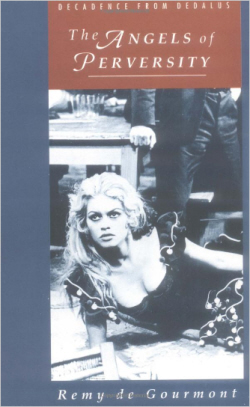Review by Glenn Russell
The Angels of Perversity is a collection of 30 short tales by
French philosopher/aesthetician/literary critic/fiction writer Remy de
Gourmont (1858 - 1915), a leading voice of the fin-de-siècle decadent
and symbolist schools who was heralded as the `critical conscience of
a generation'. Although handsome as a young man, a skin disease ravaged
his face when Gourmont was in his early 30s prompting him to become a
recluse and devote the next 25 years of his life to writing, enough writing
to fill 50 thick volumes.
Back on his fiction, here is what translator Francis Amery aka Brian
Stableford says about Gourmont in his 15 page introduction to the author's
life and times: "His one and only subject matter was sex; he was
deeply fascinated by the essential capriciousness of the sexual impulse,
by the ill-effects of social and religious repression of sexuality, and
by the intellectual strategies which might maximize the quasi-transcendental
experience of sexual rapture." Thus, with this sexual repression
and how men and women deal with their twisted sexual energy, we have the
book's title. And to provide a more specific glimpse of what one will
encounter in this provocative collection, I offer the following comments
on three of the tales:
On the Threshold
An odd-ball tale where the narrator visits the gloomy, depressing French
chateau of an old aristocrat. And what is really weird is there is a tame
heron with the name of `Missionary' who stalks from room to room as if
on a ominous mission. The narrator accidentally bumps into the heron and
says, "Go on then, Remorse." This rebuke initially upsets the
old marquis and then triggers him to disclose the sad story of his life.
When the men retire to his den, the marquis confesses to the narrator
that he himself is like the heron: he never sleeps. He goes on, "My
heart, at least, never sleeps. I am familiar with drowsiness, but I am
a stranger to unconsciousness. My dreams are simply the continuation of
my waking thoughts . . . And what do I dream about in this fashion, during
all the interminable hours of my life? Of nothing - or rather of negation,
of that which I have not done, that which I will not do, that which I
could not do, even if my youth were given back to me. For that is my nature.
I am one who has never been active, who has never lifted a finger in order
to accomplish a desire or duty."
At this point, the marquis recounts his boyhood, where an orphan cousin
was brought into his home, a beautiful blonde young girl of the same age.
However, some years after, at the time when he became more rational, he
had the experience that would define his life forever: he plucked a rose
from his garden and saw that the rose faded and withered away within the
hour. He concluded: no matter how much one yearns for roses, one must
not pluck roses. He applied this principle to every aspect of life, including
his relationship with his beautiful cousin. Indeed, although he lived
side-by-side with his cousin for another 20 years and loved her with a
burning intensity, he never `crossed the threshold', never acted on his
feelings, never permitted himself to be subject to the disenchantment
born of desire or action. And what of his beautiful cousin? She became
weak and died of love for the marquis. And, so, he has lived alone for
many years in his chateau called `Gallows-Tree House' with the black swans
swimming among broken reeds and a heron clacking its beak and staring
out of its cheerless and ironic eyes.
One can reflect on this tale in light of ongoing decadent themes: rotting
civilization, moral transgression and emotional extremes. I wouldn't be
surprised if Gourmont was inspired to write `On the Threshold' after ruminating
on a famous aphorism of Arthur Schopenhauer, the favorite philosopher
among decadent writers, "No rose without a thorn but many a thorn
without a rose."
The Faun
A young wife and mother returns from a Christmas Eve dinner nauseated
by her husband's hypocritical show of affection and weary of the laughter
of little children. Once her bedroom door is locked, she stands naked
before her mirror and, rebelling against any memory of her youth and innocence,
she turns her thoughts to sensuality. The author writes, "She gave
herself up to a dream of sumptuous fornication, imagining she might sink
into an unexpected stupor, a complaisant victim of desire, right there
beside the fire with the fur about her . . . " But such intense pleasure
doesn't last forever, for as Gourmont observes, society and religion have
turned men and especially women against their own bodies and dreams of
sensuality.
The Dress
A young man experiences an intense yearning for the fulfillment of his
love-sick heart. To this end he searches out beautiful women strolling
along the streets of Paris. But, wait - is the beauty he seeks in women?
No, not at all, for we read, "A naked woman seemed to him to be an
absurdity, an anomaly--something like a bald parrot or a plucked chicken."
What his love-sick heart yearns to unite with is a beautiful dress. That's
right - this young man has a dress fetish, a fetish leading to a warped
and sick encounter with a young woman and ultimately leading to murder.
One of the most memorable tales of sexual perversion you will ever read.
|


